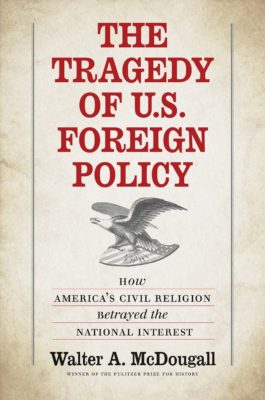A nation must think before it acts.
Chapter 17: Modern Explosions
The Tragedy of U.S. Foreign Policy:
How America’s Civil Religion Betrayed the National Interest
The original draft of this book contained 172 pages of endnotes, which had to be shed in the name of economy. Thanks to the Internet, readers can access them here. Unfortunately, of course, the author had to substitute page and paragraph numbers for the original superscripts in the text, but in most cases it should be clear which sentences in a given paragraph match up with which sources.
Paragraphs appearing in their entirety on a single page are identified by the page number (e.g., p. 122). Paragraphs divided between two pages are identified by those pages (e.g., pp. 92-93). Paragraphs that share a page with another complete paragraph are identified by the page number and paragraph number (e.g., p. 103, ¶ 1).
| Previous: Chapter 16 | Next: Chapter 18 |
Chapter 17: Modern Explosions:
173-74: John Lukacs, The New Republic: A History of the United States in the Twentieth Century (New Haven: Yale University, 2004), p. 38.
174-75: David Foglesong, The American Mission and the “Evil Empire”: The Crusade for a “Free Russia” since 1881 (New York: Cambridge University, 2007), pp. 56-79 (quotes p. 57).
175: Beverly Gage, The Day Wall Street Exploded: A Story of America in its First Age of Terror (New York: Oxford, 2009)
176: William Pencak, For God and Country: The American Legion, 1919-1941 (Boston: Northeastern University, 1989).
176-77: Lukacs, The New Republic, pp. 34-35. Robert T. Handy, Undermined Establishment: Church-State Relations in America, 1880-1920 (Princeton: Princeton University, 1991) describes the relative decline of the old Protestant consensus. On the curricula taught all across the nation by that old, New England-inspired, consensus, see Ruth Miller Elson, Guardians of Tradition: American Schoolbooks of the Nineteenth Century (Lincoln: University of Nebraska, 1964) and Elliott J. Gorn, The McGuffey Readers (Boston: Bedford, 1998).
177-78: Lukacs, The New Republic, pp. 151-52, quoting Bruce Fairchild Barton, The Man Nobody Knows: A Discovery of the Real Jesus (Indianapolis: Bobbs-Merrill, 1925). See Richard M. Fried, The Man Everybody Knew: Bruce Barton and the Making of Modern America (Chicago: Ivan R. Dee, 2005). Barton was the son of a devout Congregationalist minister, grew up in a Chicago suburb, and graduated from Amherst College in 1908. He was co-founder of the famous advertising firm BBD&O and wholeheartedly believed that material progress was the real Christian dispensation. Coolidge Address to the American Society of Newspaper Editors, Washington, D.C. (Jan. 17, 1925): https://www.presidency.ucsb.edu/ws/?pid=24180
178-79: Richard P. Gamble, The War for Righteousness: Progressive Christianity, the Great War, and the Rise of the Messianic Nation (Wilmington, Del.: ISI Books, 2003), pp. 243-45.
179: Elesha J. Coffman, The Christian Century and the Rise of the Protestant Mainline (New York: Oxford University, 2013), quotes pp. 22, 25. Needless to say, Fosdick’s developmental theology contradicts Hebrews 13:8 (“Jesus Christ is the same yesterday, today, and forever”) and Matthew 24:35 (“Heaven and earth will pass away, but My words will not pass away”).
180-81: Foglesong, The American Mission and the “Evil Empire”, pp. 56-79 (quotes pp. 60-61, 71).
| Previous: Chapter 16 | Next: Chapter 18 |




